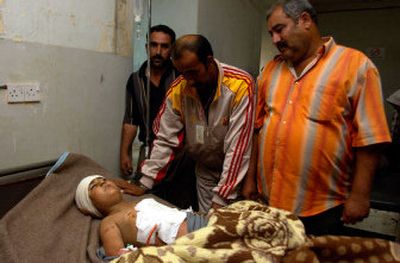Killings threaten Iraqi government

BAGHDAD, Iraq – Months of bloodshed have threatened to loosen the bonds holding together Iraq’s fractious government, with tensions among political blocs spilling out in recent days in fiery sectarian rhetoric as well as fighting that left at least 130 people dead nationwide.
Disagreements over several contentious issues burst out into the open with a highly divisive vote on the issue of parceling Iraq into federal districts, finger-pointing over the assassination of a top politician’s brother and bloody massacres between rival Shiite Muslims and Sunni Arabs north of the capital.
There, among the lush palm groves and towns along the Tigris River, at least 73 people were killed in sectarian violence over the weekend. Shiite gunmen, seeking revenge for the beheadings of 26 farmers whose bodies were found in Sunni villages, marauded through the farming hub of Balad, about 50 miles north of the capital, officials said. The assailants randomly killed Sunni men in the market, hospitals and a used-car lot, the officials said, with 12 victims reportedly torched to death.
Sunni tribesmen in farms outside Balad are lobbing mortar rounds into the Shiite-dominated town and arming themselves for further fighting, said residents of the Sunni village of Duluiyah. U.S. forces imposed a curfew on the area by midafternoon.
Meanwhile, authorities awaited the fate of several groups of Shiite men kidnapped from minibuses over the weekend on their way out of the Shiite village of Dujail.
Also Sunday, six car bomb explosions killed about 10 people and injured dozens around the contested northern city of Kirkuk, claimed by Arabs as well as ethnic Kurds who inhabit a semiautonomous section of northern Iraq. In the capital, at least 52 Iraqis, including two children, were reported killed in shootings, rocket attacks, bombings and clandestine sectarian killings.
The U.S. military, meanwhile, reported that one Marine and four soldiers were killed Friday and Saturday, according to the Associated Press.
Iraq’s Sunni insurgents are fighting a guerrilla war against American forces and the U.S.-backed Shiite- and Kurdish-dominated government. Shiite gunmen, with possible ties to powerful political parties, fight back by killing suspected insurgents and ordinary Sunnis alike. Many Iraqis call the waves of violence a civil war tempered only by the ongoing political process.
But relations between the main Sunni and Shiite political blocs also have worsened over the past week. On Sunday, the government indefinitely postponed a highly publicized conference to discuss reconciliation among Iraq’s disparate groups that was to begin Saturday. According to a news release, the conference was canceled for unspecified “emergency reasons.”
Acrimony among the country’s major ethnic and religious groups swelled after the Shiite and Kurdish dominated parliament passed a law last Wednesday allowing for the eventual division of Iraq into federal regions.
Sunni Arabs suspect Shiites have agreed to cede the northern oil hub of Kirkuk to autonomy-minded Kurds in exchange for support of an oil-rich Shiite southern region in the future. About 500 mostly Sunni Arab tribal leaders attending a summit in northern Iraq on Sunday vowed to fight any federal partitioning of the country, which they fear might further impoverish Sunnis in resource-poor central and western Iraq.